In the rapidly evolving digital landscape, chatbots have emerged as a vital tool for businesses seeking to enhance customer engagement, streamline support processes, and boost overall efficiency. Recent studies suggest that by 2023, approximately 80% of businesses are expected to incorporate chatbots into their operations, highlighting their growing importance in today's online realm.
However, with a ton of chatbot features available, it can be overwhelming to determine which ones are the best fit for your website. In this comprehensive guide, we will delve into the critical aspects of choosing the perfect features for your website chatbot.
By the end of this post, you'll be equipped with the knowledge to create a high-performing chatbot that delivers a remarkable user experience, leaving your visitors thoroughly impressed.
Let’s dive in!
Why Opt for a Chatbot for Your Website?
In today's digital landscape, having a chatbot on your website is no longer just a luxury, but a necessity.
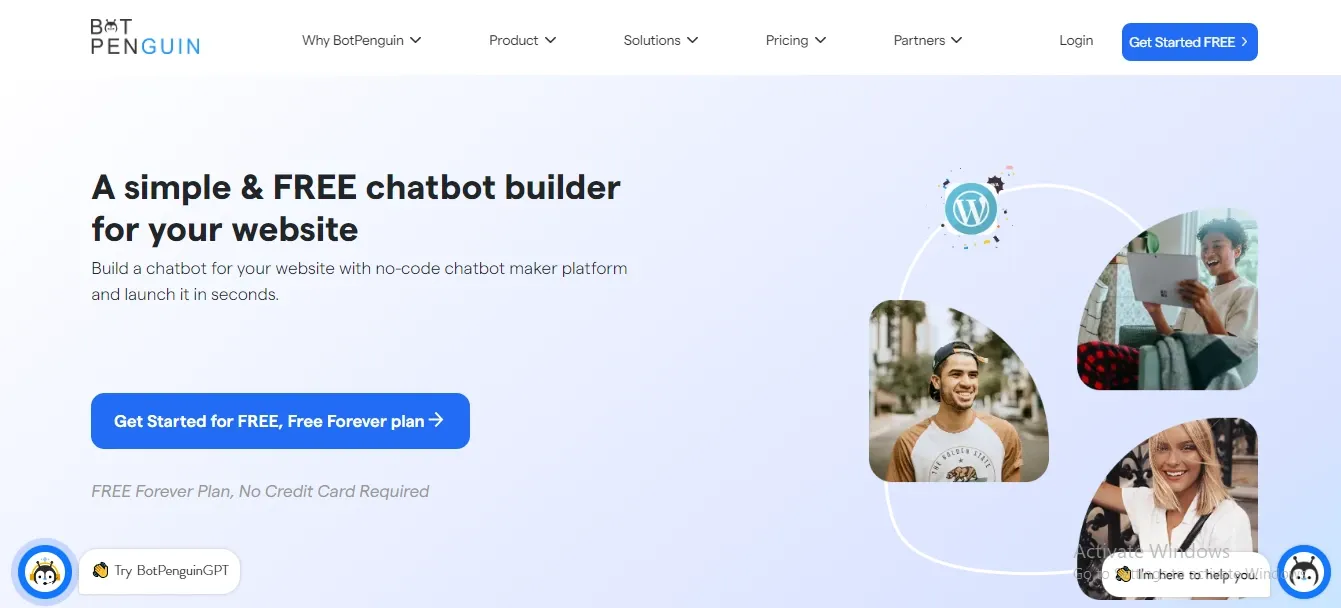
Improved Customer Experience
Chatbots provide instant support, addressing customer queries and concerns in real-time. This leads to a more satisfying and personalized experience, making customers feel valued and heard.
24/7 Availability
Unlike human support agents, chatbots are available round-the-clock, ensuring that your customers receive assistance whenever they need it, even during non-business hours.
Build your own Website Chatbot using BotPenguin, it also offers chatbot creation for social platforms, websites, wordpress:
Cost-Effective Solution
Integrating a chatbot on your website can significantly reduce operational costs. By automating routine tasks and handling basic inquiries, chatbots free up your human support agents to focus on more complex issues, thereby increasing overall efficiency.
Faster Response Times
Chatbots can handle multiple conversations simultaneously, providing instant responses to customer inquiries.
This reduces wait times and keeps your customers engaged, leading to higher satisfaction levels.
Enhanced Lead Generation
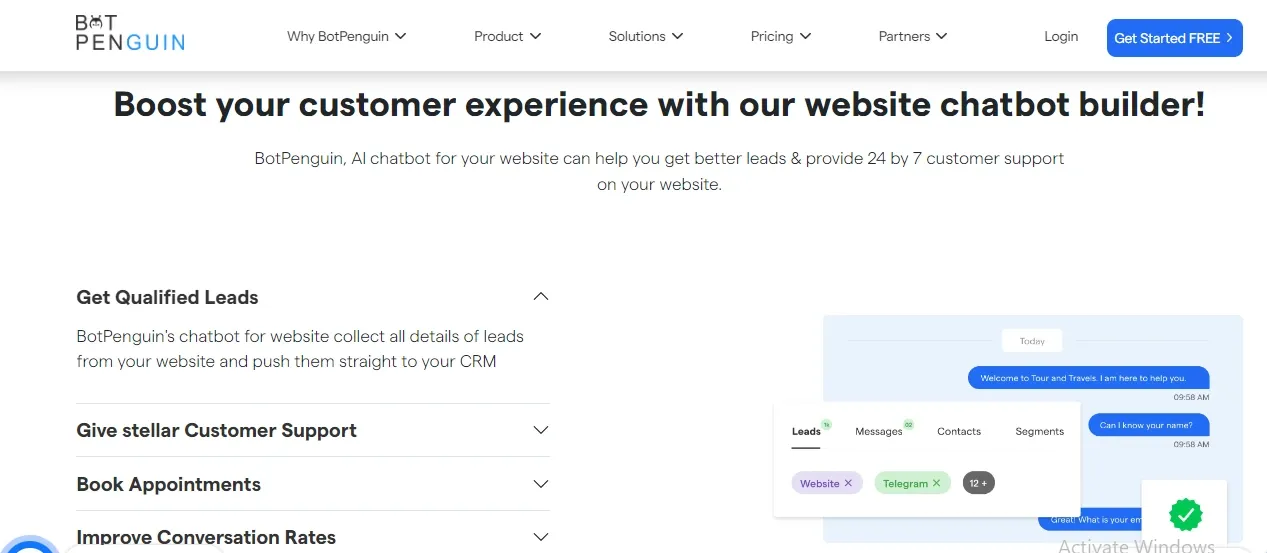
Chatbots can proactively engage with website visitors, collecting valuable information, and qualifying leads.
This data can be utilized by your sales team to follow up with potential customers, ultimately boosting your conversion rates.
Easy Integration
Chatbots can be easily integrated with various platforms, such as CRM systems, social media, and messaging apps, providing a seamless and unified customer experience across multiple channels.
In conclusion, incorporating a chatbot into your website can significantly enhance customer experience, improve efficiency, and drive business growth.
By carefully selecting the right chatbot features, you can create a tailored solution that caters to your specific needs and objectives.
Streamlined Support
By automating repetitive tasks and answering frequently asked questions, chatbots help streamline your customer support process.
This not only reduces the workload for your support team but also ensures that customers receive consistent and accurate information.
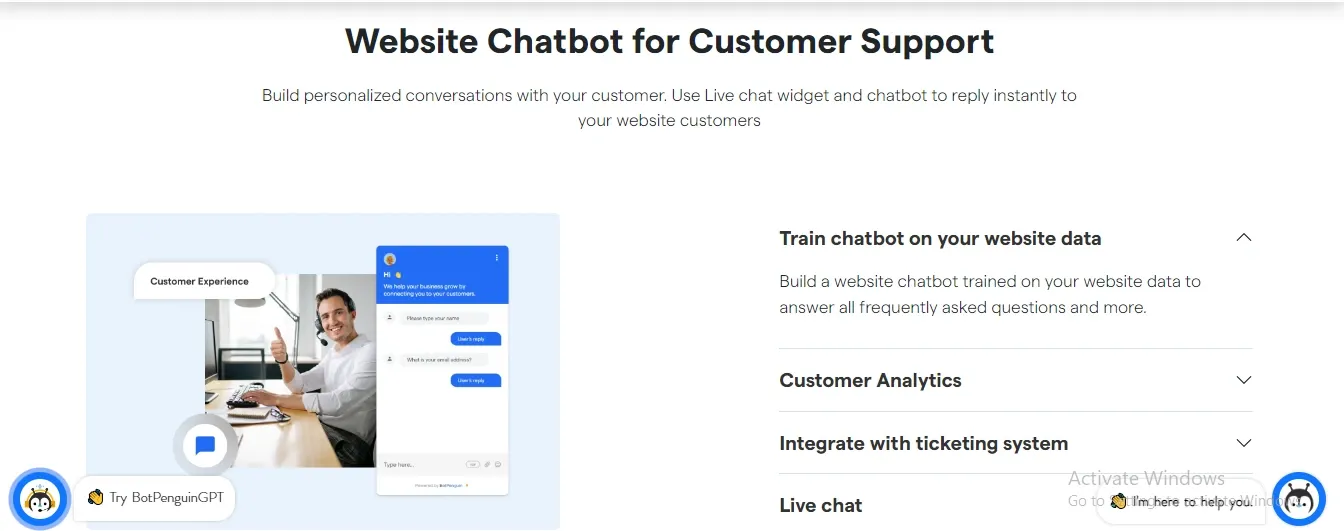
How to choose the right features for your chatbot?
Making calculative decisions that align with your needs is necessary when choosing the right features for your chatbot. Here are some factors that can help you out with the process.
Identifying Your Website's Purpose and Goals
Before choosing the perfect features for your website chatbot, it's essential to clarify the purpose and goals of your website. Consider what you aim to achieve through the chatbot's presence.
Is it to provide customer support, generate leads, or improve user engagement? Understanding your website's objectives will help you align the chatbot's features accordingly.
Analyzing Your Target Audience
To select the right features for your chatbot, it's crucial to analyze your target audience. Identify their demographics, preferences, and needs. Are they tech-savvy and accustomed to using chatbots?
What are their most common inquiries or requests? By understanding your audience, you can determine the features that will cater to their specific requirements.
Defining the Chatbot's Role and Scope
Clearly defining the role and scope of your chatbot is essential for feature selection. Decide whether your chatbot will serve as a support agent, provide information, or assist with transactions.
Determining its primary functions will help you identify the features necessary to fulfill its designated role effectively.
Considering Conversational Capabilities
A key aspect of a chatbot is its conversational capabilities. Assess the level of sophistication required for your chatbot to engage users effectively.
Consider features like natural language processing, sentiment analysis, and context retention to ensure smooth and meaningful conversations that mimic human interactions.
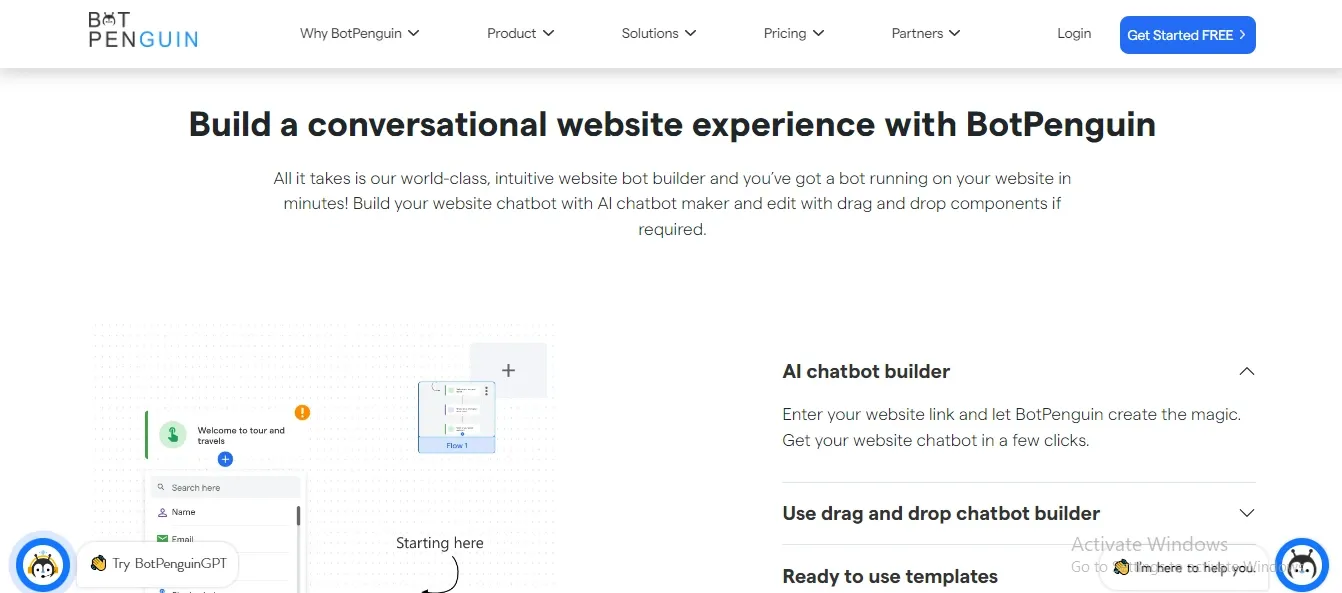
Prioritizing Core Functionality
Focus on the core functionality that your chatbot should possess. These features should address the most common user needs and align with your website's goals.
Examples of core features include answering frequently asked questions, providing product information, and assisting with basic troubleshooting.
Integration with Existing Systems
Evaluate the compatibility of your chatbot with existing systems and platforms. Determine if you need the chatbot to integrate with your CRM, ticketing system, or knowledge base.
Seamless integration allows the chatbot to access relevant information and provide accurate responses to users.
Personalization and User Experience
Consider features that enhance personalization and improve the user experience. Features such as user profiling, historical context retention, and recommendations based on user preferences can create a tailored experience for each visitor.
A personalized chatbot experience fosters engagement and builds customer loyalty.
Mobile Responsiveness
As mobile usage continues to rise, ensuring your chatbot is mobile-responsive is crucial. Choose features that adapt well to different screen sizes and operating systems.
This allows users to interact with your chatbot seamlessly, regardless of the device they're using.
Analytics and Reporting
Implementing analytics and reporting features enables you to track the performance of your chatbot. These features provide valuable insights into user interactions, popular queries, and areas for improvement.
Analytics help you refine your chatbot's features over time, ensuring its continuous enhancement and effectiveness.
Scalability and Future Growth
Consider the scalability of your chatbot's features to accommodate future growth. Ensure that your chosen features can handle increased user volumes, expanding functionalities, and evolving user expectations.
Scalability is vital for long-term success and maximizing the value of your chatbot investment.
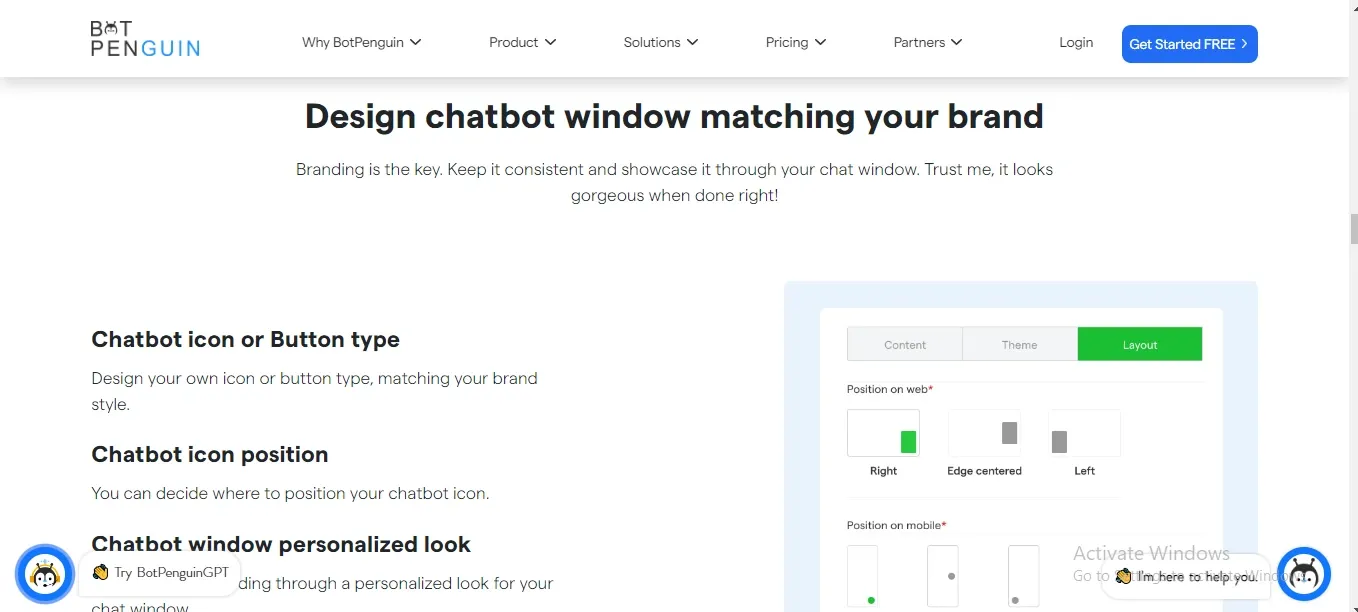
Use Cases For Website Chatbots
Now that you know what features to choose, the next step is to understand the various use cases that your website chatbot can provide.
Enhancing Customer Engagement
A website chatbot offers a powerful way to enhance customer engagement on your website. By providing instant responses to customer queries and offering personalized assistance, the chatbot creates an interactive and engaging experience.
Customers can receive immediate support, browse through product information, and seek guidance, all within the convenience of the chat interface.
24/7 Availability
A chatbot on your website ensures round-the-clock availability to assist visitors, even outside regular business hours. Customers no longer have to wait for a human agent to be available; they can get immediate assistance and support at any time.
This availability boosts customer satisfaction and ensures that no query goes unanswered, ultimately improving the overall customer experience.
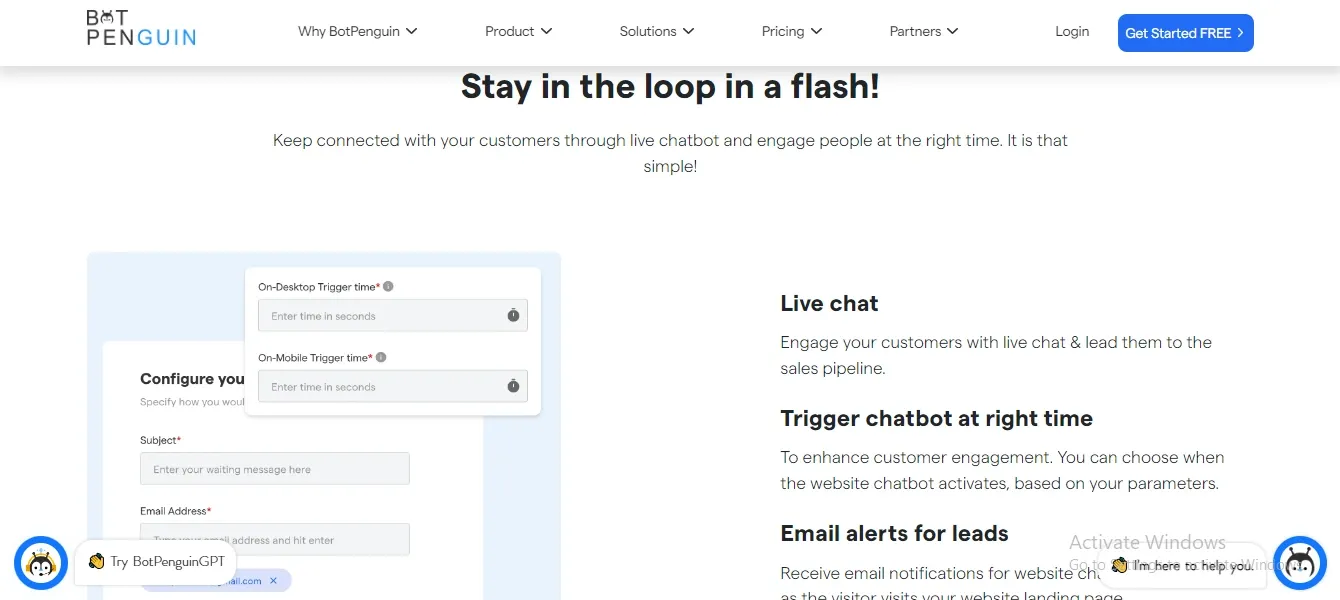
Handling Frequently Asked Questions (FAQs)
One of the primary use cases for a website chatbot is to handle frequently asked questions. The chatbot can provide quick answers to common queries, saving time for both customers and support agents.
By automating the responses to FAQs, the chatbot frees up human agents to focus on more complex and specialized customer inquiries.
Lead Generation and Qualification
A website chatbot can play a crucial role in lead generation and qualification. By engaging visitors in personalized conversations, the chatbot can collect relevant information and assess their needs.
This data can be used to identify potential leads and prioritize them based on their likelihood of conversion, enabling more targeted marketing and sales efforts.
Guiding Customers Through the Sales Funnel
A chatbot can act as a virtual sales assistant, guiding customers through the sales funnel. It can recommend products or services based on customer preferences, answer questions about features or pricing, and provide additional information to help customers make informed purchase decisions.
The chatbot's personalized recommendations and support can significantly enhance the conversion rate and drive sales.
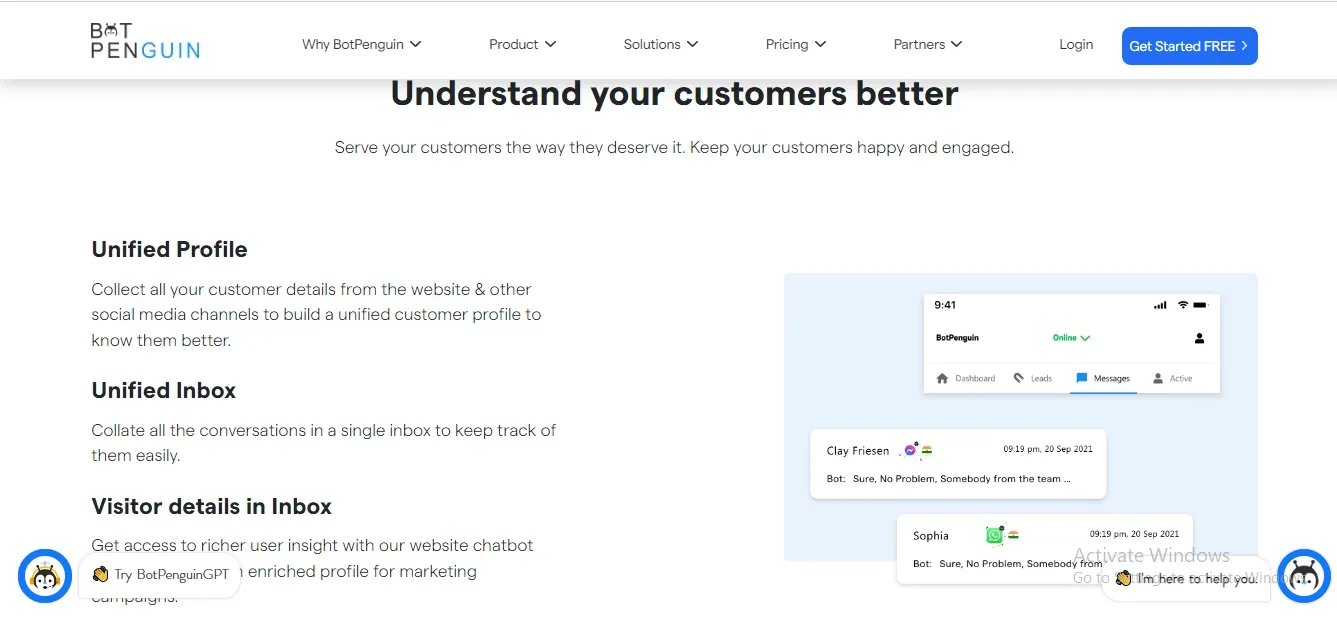
Assisting with Order Tracking and Support
Website chatbots can streamline the order-tracking process and provide support throughout the customer journey. Customers can check the status of their orders, get updates on delivery schedules, and resolve any issues or concerns promptly.
The chatbot can automate these tasks, providing real-time information and reducing the need for manual intervention.
Offering Product Recommendations
By analyzing customer preferences and purchase history, a chatbot can offer personalized product recommendations. It can suggest complementary items, showcase new arrivals, or present limited-time offers, tailored to individual customer interests.
These recommendations enhance the customer experience and increase the likelihood of upselling and cross-selling opportunities.
Conducting Surveys and Gathering Feedback
A website chatbot can serve as a valuable tool for conducting surveys and gathering feedback. It can initiate interactive conversations, ask targeted questions, and collect customer opinions and suggestions.
The chatbot's automated survey process ensures consistent data collection and analysis, enabling businesses to make data-driven decisions and improve their products or services.
Providing Self-Service Support
Empowering customers with self-service support is another key use case for a website chatbot. By offering step-by-step instructions, troubleshooting guides, and relevant resources, the chatbot enables customers to resolve common issues independently.
This reduces the dependency on human support agents for routine inquiries, freeing them to focus on more complex and critical tasks.
Integration with Other Systems
A website chatbot can be integrated with other systems and platforms, such as CRM software or ticketing systems.
This integration allows the chatbot to access customer information, retrieve order details, or create support tickets, providing a seamless and efficient customer experience.
The chatbot acts as a centralized hub, consolidating data and interactions to enhance customer support and streamline internal processes.
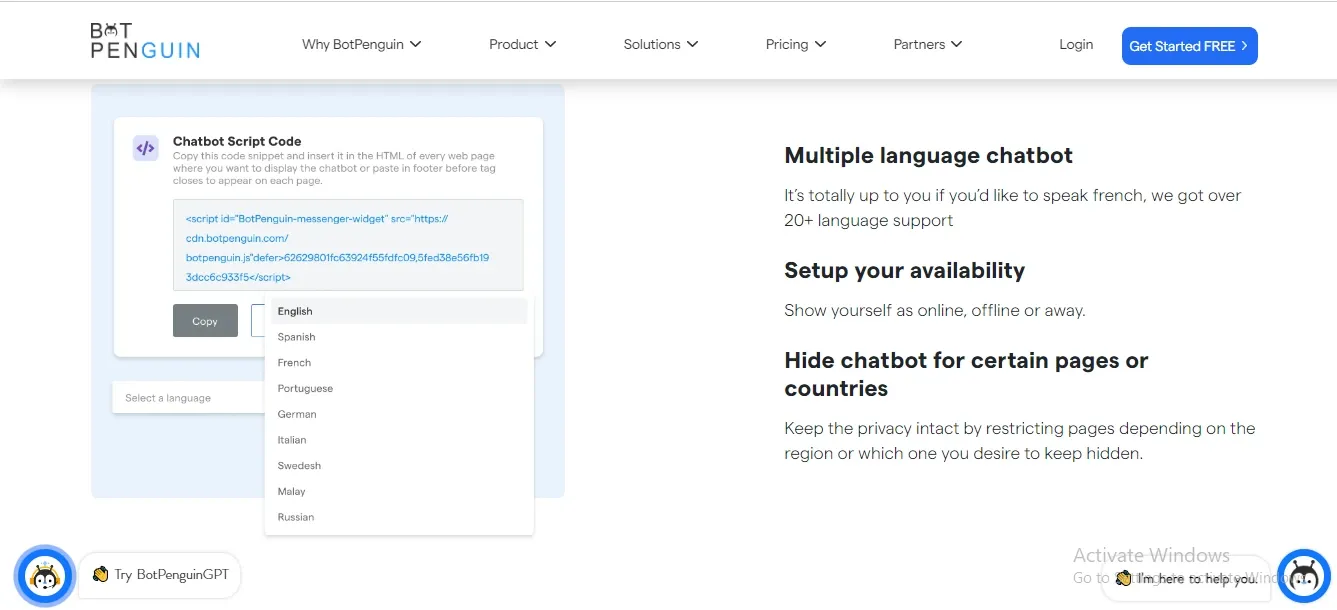
Also Read:
Conclusion
Selecting the perfect features for your website chatbot is a crucial step towards enhancing customer engagement, satisfaction, and driving business growth. By understanding your audience, defining your chatbot's purpose, and evaluating various features, you can create a tailored chatbot experience that meets your unique needs
To make this process seamless and efficient, consider using BotPenguin - a cutting-edge chatbot platform that offers a wide range of customizable features, easy integration, and exceptional support.
With BotPenguin, you can effortlessly build a high-performing chatbot that not only elevates your user experience but also gives your business a competitive edge. Embrace the future of customer engagement with BotPenguin today!
Frequently Asked Questions (FAQs)
What factors should I consider when choosing features for my website chatbot?
When choosing features for your website chatbot, consider your target audience, the purpose of the chatbot, the complexity of interactions required, integration capabilities, and the level of personalization and customization needed.
How do I determine the right level of automation for my chatbot?
The level of automation depends on your specific requirements. Consider the types of queries your chatbot will handle and the desired balance between automated responses and human intervention for more complex or sensitive issues.
Should I include a live chat option alongside the chatbot?
Including a live chat option alongside the chatbot can be beneficial. It allows users to escalate to a human agent when necessary, providing a seamless transition for more personalized or in-depth assistance.
What types of natural language processing (NLP) capabilities should my chatbot have?
Your chatbot should have NLP capabilities that enable it to understand and interpret user inputs accurately. This includes features like intent recognition, entity extraction, sentiment analysis, and context awareness.
Is it important to have multi-language support for my chatbot?
If your target audience consists of users who speak different languages, having multi-language support is crucial. It ensures a wider reach and enhances user experience by allowing users to interact with the chatbot in their preferred language.
How can I integrate my chatbot with other systems or platforms?
Integrating your chatbot with other systems or platforms allows for a more seamless user experience. Consider integration options with customer relationship management (CRM) systems, helpdesk software, e-commerce platforms, or social media platforms, depending on your business needs.
What kind of analytics and reporting features should I look for in a chatbot?
Analytics and reporting features are essential for tracking the performance and effectiveness of your chatbot. Look for features that provide insights into user interactions, conversation flows, user satisfaction, and conversion rates.
Should I prioritize personalization features in my chatbot?
Personalization features can greatly enhance user engagement. Consider features like user profile management, personalized recommendations, and customized responses based on user preferences or previous interactions.
How can I ensure data security and user privacy with my chatbot?
Data security and user privacy are crucial considerations. Choose a chatbot platform that offers secure data storage, encryption protocols, compliance with data protection regulations, and clear privacy policies.
What kind of ongoing maintenance and support should I expect for my chatbot?
Ensure that the chatbot platform provides ongoing maintenance, updates, and technical support. Look for features like easy content management, training capabilities, and a user-friendly interface that allows for continuous improvement and adjustments to meet evolving user needs.

